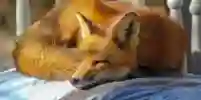University Challenge: Researchers test raccoon and opossum intelligence in food survival task
A new study has shown that street-smart raccoons outwit their marsupial rivals, the Virginia opossum, in a food challenge in research into urban wildlife survival.
Researchers from the University of Hull set up motion detection cameras to film the animals, common across North America, as they took part in a problem-solving task to access a food reward.
They wanted to shed light on how differences in behaviour helps to determine which species are better able to survive in increasingly human-modified environments, such as cities.
Estimates suggest that wildlife population sizes have decreased by 73 per cent over the past 50 years. Human activities, such as urbanisation, pollution, overexploitation, the introduction of invasive species, and climate change, are driving some species to the verge of extinction. While many species are threatened, some, such as raccoons, are thriving.
The study, published in the journal Animal Behaviour, revealed that while raccoons and opossums were equally likely to approach and touch the unfamiliar task, raccoons were significantly more successful at solving it. The task tested the ability of each species to innovate.
Dr Blake Morton, Animal Behaviourist at the University of Hull and senior author on the paper said: “It’s still not clear why some species are able to thrive despite on-going environmental changes caused by people.
“Moving into new habitats and trying out novel foods is risky... To take advantage of new forms of food, animals must be bold but might also have to invent entirely new behaviours to overcome barriers"Dr Blake Morton
Lecturer in Psychology
“Raccoons and opossums are both dietary generalists, able to take advantage of a wide variety of food sources, but the range of habitats inhabited by raccoons is far broader.
“Moving into new habitats and trying out novel foods is risky; animals might be trapped, poisoned, or eaten, for example. To take advantage of new forms of food, animals must be bold but might also have to invent entirely new behaviours to overcome barriers, to figure out how to access unfamiliar food challenges.”
To test the animals’ ability to innovate, dog food or corn was placed in plastic cups and suspended with string or fishing line from overhead tree branches. Cameras triggered by motion sensors recorded the animals as they set about solving the challenge – how to reach down or up to the cups, or to lift or tip the cup to secure a meal.
Dr Morton said: "While opossums mostly tried to reach down from the branch, raccoons developed a much wider range of clever techniques, such as sitting on the branch above, sometimes even hanging upside down from it, in order to pull on the string, paw over paw, to raise the cup to their level.
Kristy Adaway, a PhD student who led the study said: “Our research suggests that raccoons’ ability to innovate and solve novel foraging challenges may be important for their success – not only in their native habitats but across Europe and Japan where they are increasingly seen as an invasive species. For animals that are less innovative, environmental pressures may be harder to overcome.”
The range of raccoon behaviours in solving the challenge is caught on camera here.
To learn more about this study, read the full journal article here.
To learn more about Dr Morton’s research group, see here.
Share this story
Last updated 01 September 2025, 13.24
Neil Trotter
Corporate Communications Specialist
What to read next

Urban foxes: bold, brazen or simply misunderstood?
08 August 2023

Foxes may be bold and crafty, but we love them anyway!
31 October 2024
Media enquiries
For all enquiries, please get in touch with our press office.